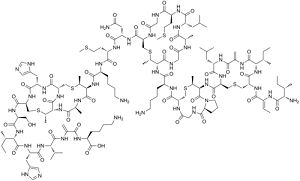Nisin

Product Description
Nisin is a natural antimicrobial peptide produced by certain strains of the bacterium Lactococcus lactis. It has various industrial and commercial applications, primarily in the food and beverage industry.
Product:
Nisin
CAS:
1414-45-5
Synonym:
Nisin from Lactococcus lactis
Structure:

Typical Characteristics
Appearance
White to light yellow and faint beige to light beige powder
Boiling point
2966 °C
Density
1.402 g/cm3
Molecular Weight
3354.07
Purity
98%
Uses, Applications & Markets
Key applications
Markets
get a quote



Nisin used in many
industry applications
Nisin is a natural antimicrobial peptide produced by certain strains of the bacterium Lactococcus lactis. It has various industrial and commercial applications, primarily in the food and beverage industry. Here are some of its uses:
- Food Preservation: Nisin is widely used as a natural preservative in food products to inhibit the growth of spoilage microorganisms and foodborne pathogens. It is particularly effective against gram-positive bacteria such as Listeria monocytogenes, Staphylococcus aureus, and Clostridium botulinum. Nisin helps extend the shelf life of perishable foods, including dairy products, meats, canned goods, sauces, dressings, and processed foods.
- Antimicrobial Agent: Nisin exhibits potent antimicrobial activity against a broad spectrum of bacteria, making it valuable for controlling microbial contamination in various food processing environments and industrial settings. It can be used to sanitize food contact surfaces, equipment, and packaging materials to ensure product safety and compliance with hygiene standards.
- Biopreservation: Nisin is used in biopreservation applications to protect food products from microbial spoilage without the need for chemical preservatives or synthetic additives. It offers a natural and consumer-friendly alternative to traditional preservatives, helping maintain the quality, flavor, and nutritional value of foods while minimizing the risk of microbiological contamination.
- Food Additive: Nisin is approved as a food additive by regulatory agencies worldwide, including the Food and Drug Administration (FDA) and the European Food Safety Authority (EFSA). It is classified as a natural antimicrobial agent (E234) and can be added to food formulations within specified limits to improve safety, stability, and microbial control.
- Ingredient in Dairy Products: Nisin is commonly used in the dairy industry to preserve and extend the shelf life of dairy products such as cheese, yogurt, cottage cheese, and cream. It helps inhibit the growth of spoilage bacteria and molds, preventing defects such as gas formation, off-flavors, and texture changes in dairy products during storage and distribution.
- Beverage Preservation: Nisin is used in the beverage industry to prevent microbial contamination and spoilage in various liquid products such as fruit juices, soft drinks, alcoholic beverages, and sports drinks. It can be added directly to beverages or incorporated into beverage packaging materials to maintain microbiological stability and freshness.
- Meat and Poultry Processing: Nisin is utilized in meat and poultry processing to enhance food safety and control the growth of pathogenic bacteria such as Salmonella and Escherichia coli. It can be applied as a surface treatment, injection solution, or ingredient in marinades, brines, and curing solutions to inhibit bacterial growth and reduce the risk of foodborne illness.
- Quality Assurance: Nisin is used as a quality assurance tool in food manufacturing and processing facilities to meet stringent microbial safety standards and regulatory requirements. It can help food manufacturers ensure compliance with Good Manufacturing Practices (GMP), Hazard Analysis and Critical Control Points (HACCP), and other food safety management systems.
- Biotechnology: Nisin has potential applications in biotechnology and pharmaceutical research due to its antimicrobial properties and low toxicity profile. It may be investigated for use in medical devices, wound dressings, oral care products, and antimicrobial formulations targeting infectious diseases and multidrug-resistant pathogens.
- Research and Development: Nisin is the subject of ongoing research and development efforts aimed at exploring its therapeutic potential, mechanism of action, and applications beyond food preservation. Studies may focus on optimizing production methods, enhancing stability and bioavailability, and discovering novel applications in healthcare, agriculture, and biotechnology.